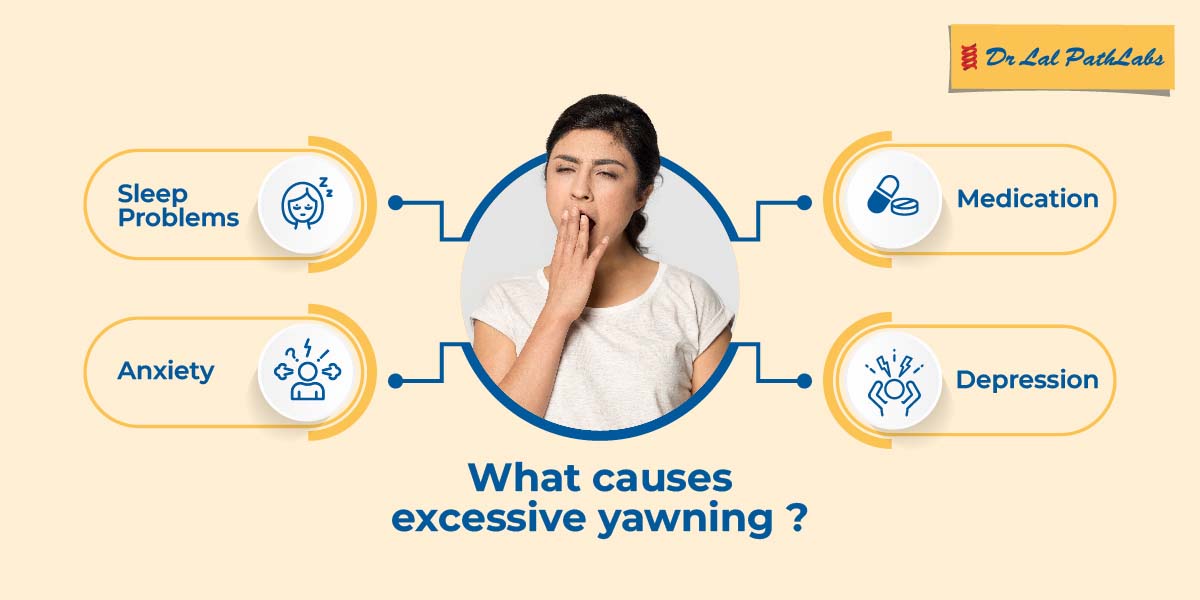Excessive Yawning: Causes and Diagnosis
Yawning is a natural and harmless response to being bored, tired, or sleepy. Yawning is also contagious: research shows that 50% of people yawn involuntarily when they watch videos of other people yawning. The chances are you’re probably feeling like yawning after reading this sentence as well.
But do you find yourself yawning too often for no apparent reason? Do your colleagues or family members often point out your frequent yawning?
If yes, the chances are that you may have an underlying health condition.
What causes excessive yawning?
Sleepiness and boredom are the most common causes of excessive or frequent yawning.
Some people wonder if too much yawning is a sign of a lack of oxygen. In some cases, yes. A yawn makes you intake more air to provide a fresh supply of oxygen to the blood. Similarly, drowsiness and fatigue often cause excessive yawning during pregnancy.
Here are some fewer common causes:
- Sleep deprivation
- Underlying sleep disorders (such as narcolepsy or sleep apnoea)
- Side effects of certain medications like selective serotonin reuptake inhibitors (SSRIs)
- Excessive yawning may be associated with heart problems (especially if it is accompanied by symptoms of chest pain or discomfort, upper body discomfort, light headedness, and shortness of breath)
- Epilepsy
- Neurological disorders like multiple sclerosis (MS)
- Liver failure or weak liver
- A brain tumour, though this condition is rare
- Vasovagal reactions which cause your heart rate and blood pressure to plummet
Causes of Excessive Yawning
To identify the root cause of frequent yawning, your doctor will first ask you about your sleep habits and any medications you have been prescribed. They will check if you are getting adequate sleep or have an undiagnosed sleep disorder. Once these issues are ruled out, they may perform additional diagnostic tests.
An electroencephalogram (EEG) is one such test. An EEG test maps the electrical activity in your brain and is accepted as a reliable indicator of brain conditions like:
- Epilepsy
- Parasomnia (such as somnambulance or sleepwalking)
- Brain injuries
- Stroke
- Dementia
Your doctor may order an MRI (Magnetic resonance imaging) scan if they suspect:
- Disorders of the spinal cord and brain
- Tumours
- Heart problems
- Abnormalities in the liver
- Joint injuries
How to Treat Frequent Yawning?
1. Constant yawning caused by medications
If medications are the cause of your constant yawning, your doctor may simply recommend a lower dosage. Always start by gradually withdrawing the medication and never go cold turkey.
2. Excessive yawning due to sleep disorders
If continuous yawning occurs because of a sleep disorder, your doctor may prescribe sleep-aid supplements like melatonin or other medications. You can also use simple techniques for a more restful sleep, such as:
- Adhering to a regular sleep schedule
- Exercising regularly
- Avoiding caffeine, alcohol, large meals, and strenuous exercise before bed
- Keeping your room dark, cool, and quiet
- Removing distractions and switching off electronic devices
3. Other serious medical conditions
If excessive yawning is a symptom of any other serious underlying health condition like epilepsy or liver failure, seek treatment immediately.
Should you see a doctor for frequent yawning?
It is best to talk to a doctor if you have noticed a sudden increase in your yawning for no apparent reason. They can help determine whether or not continuous yawning is pointing to a larger issue.
Before you visit your doctor, prepare a detailed list of your current medications, history of ailments and medical conditions, and the timings and frequency of your yawning.
If you do get diagnosed with an underlying medical condition, take steps to combat it and stop it in its tracks. But if your yawning is just a symptom of poor sleep and inadequate rest, proactively making lifestyle changes can help solve the problem.














